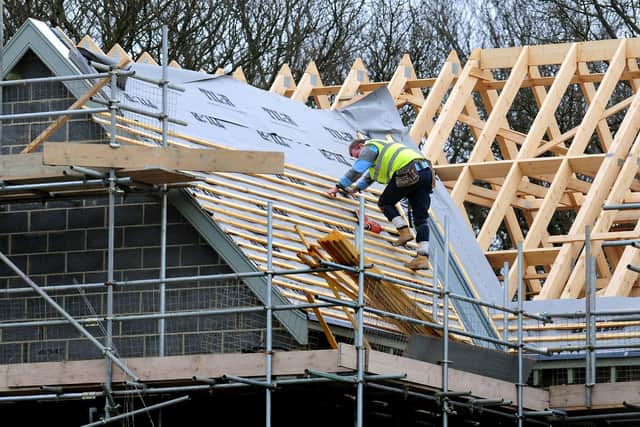Construction activity hits 24-year high as housebuilding sector booms
However, firms said that record demand for products and materials resulted in “severe shortages” and soaring inflation.
The closely monitored IHS Markit/Cips purchasing managers’ index (PMI) hit 66.3 in June, increasing from 64.2 in May. Any reading above 50 denotes growth.
Advertisement
Hide AdAdvertisement
Hide AdThe latest report said that the leap in output was particularly driven by the housebuilding sector, which posted a 68.2 reading for the month.


Tim Moore, economics director at IHS Markit, said: “June data signalled another rapid increase in UK construction output as housing, commercial and civil engineering activity all expanded at a brisk pace.
“Total new orders expanded at one of the strongest rates since the summer of 2007, mostly reflecting robust demand for residential projects and a boost to commercial work from the reopening UK economy.”
Survey respondents highlighted a “rapid turnaround in demand for new construction work” which residential and commercial projects accelerated following the reopening of the UK economy.
Total new orders have now increased for each of the past 13 months.
Firms surveyed said that this surge in orders and Brexit-related concerns have weighed heavily on their supply chains and caused supplier delivery times to lengthen.
Duncan Brock, group director at the Chartered Institute of Procurement & Supply (Cips), said: “A wave of new orders overwhelmed supply chains again this month where stock levels could not keep up with building work accelerating at the fastest rate since June 1997.
“A lack of delivery drivers and logistics difficulties for EU imports left stock undelivered or unavailable and construction companies waited while costs mounted.
Advertisement
Hide AdAdvertisement
Hide Ad“Construction’s heavy load remains inflation rising to its highest rate since April 1997 as a staggering 86 per cent of respondents reported paying more for their goods in June.”
Max Jones, director in Lloyds Bank’s infrastructure and construction team, said: “Contractors hope that the start of summer will see the sun shining on their fortunes, but they’re also mindful of the risks of being burned.
“Pent-up demand for work on commercial projects in major cities, infrastructure in the regions and housing developments across the country threaten a battle for materials that many report are in short supply. This will create pinch points and potentially push up prices, eroding margins.”
Gareth Belsham, director of property consultancy and surveying firm Naismiths, noted: “Demand has got so hot, and the supply chain so stretched, that increasing numbers of projects are being burnt by material cost inflation and delays.
“With waves of new orders still flooding in, Britain’s builders are scrambling to keep up – taking on more staff and ramping up their use of sub-contractors.
“But the real pinchpoint is building materials. A double-whammy of post-Brexit trade friction and the pandemic’s legacy means the industry is suffering severe shortages of key materials including cement, concrete, plaster, steel, timber and roof tiles.
“Input costs – which include materials and labour – are rising at their fastest pace since records began nearly a quarter century ago, and delivery times have never been longer.”
A message from the Editor:
Thank you for reading this article. We’re more reliant on your support than ever as the shift in consumer habits brought about by coronavirus impacts our advertisers. If you haven’t already, please consider supporting our trusted, fact-checked journalism by taking out a digital subscription: www.scotsman.com/subscriptions
Comments
Want to join the conversation? Please or to comment on this article.
